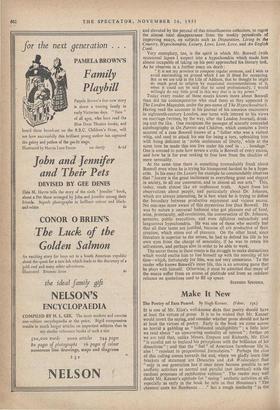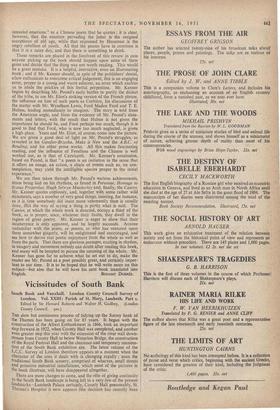Make It New
The Poetry of Ezra Pound. By Hugh Kenner. (Faber. 2 cs.)
IT is one of Mr. Eliot's well-known dicta that poetry should have at least the virtues of prose. It is to be wished that Mr. Kenner would invert the saying, and consider whether prose should not have at least the virtues of poetry. Early in the book we come across so horrid a gabbling as "habituated intelligibility" ; a little later we read about "an unwavering centrality of interest" ; further on we are told that, unlike Messrs. Empson and Richards, Mr. Eliot "is careful not to becloud his perceptions with the brilliance of his dissections" ; and that the " feel " of American farmhouse life is,
alas ! resistant to propositional formulation." Perhaps the c/ou of this culling comes towards the end, where we gladly learn (the brackets of statement are Descartes and Ash Wednesday) that "only in our generation has it once more become possible to see aesthetic activities as normal and parallel (not identical) with the cardinal processes of rectificative volition." The reader may well doubt Mr. Kenner's aptitude for " seeing " aesthetic activities at all, especially as early in the book he tells us that Housman's "The chestnut casts his flambeaux . . ." has a rough similarity "in the intended emotions" to a Chinese poem that he quotes ; it is clear, however, that the emotion pervading the latter is the resigned acceptance of old age, while that expressed by Housman is the angry rebellion of youth. All that the poems have in common is that it is a rainy day, and that there is something to drink.
These remarks are placed in the forefront of this review in case anyone picking up the book should happen upon some of these gems and decide that the thing was not worth reading. This would be a great mistake. It is a helpful, instructive, even an illuminating book ; and if Mr. Kenner should, in spite of the publishers' denial, allow enthusiasm to overcome critical judgement, this is an engaging error, proper to a young and warm admirer, an error which enables us to abide the prickles of this fretful porpentine. Mr. Kenner begins by describing Mr. Pound's early battles to purify the dialect of the tribe, to use Mr. Eliot's striking version of the French phrase, the influence on him of such poets as Corbiere, his discussions of the matter with Mr. Wyndham Lewis, Ford Madox Ford and T. E. flulme, leading immediately to imagism. The story is told from the American angle, and from the evidence of Mr. Pound's state- ments and letters, with the result that Hulme is not given the importance he should be, and Ford perhaps too much, though it is good to find that Ford, who is now too much neglected, is given a high place. Yeats and Mr. Eliot, of course, come into the picture. We are given a good deal of light on Mr. Pound's struggles, as revealed in his Gaudier-Brzeska, Make it New and the A.B.C. of Reading, and his other prose works. All this makes fascinating reading, and the influence of Fenellosa and the Chinese is well worked out, as is that of Cavalcanti. Mr. Kenner's conclusion, based on Pound, is that "a poem is an imitation in the sense that it offers an image, an action, a chain of events such as, on con- templation, may yield the intelligible species proper to the initial experience."
We are then taken through Mr. Pound's various achievements, stress being laid on his rhythms, as found in Personae, Homage to Sextus Propertitts, Hugh Selwyn Mauberley and, finally, the Cantos. Mr. Kenner quotes copiously, and, together with some rather wild statements, says a number of very good things, insisting, for instance, as it is time somebody did insist more vehemently than is usually done, that the way of saying a thing is partly what is said. The Cantos, at which the whole work is directed, occupy a third of the book, as is proper, since, whatever their faults, they dwell in the region of great poetry. Mr. Kenner is eager to show that their incoherence is only apparent, and he largely succeeds. Anyone unfamiliar with the poem, or poems, or who has ventured upon them somewhat gingerly, will be enlightened and encouraged, and see how to derive real poetic enjoyment from the whole as well as from the parts. That there are glorious passages, exciting in rhythm, in imagery and movement nobody can doubt after reading this book, and many will be tempted to pursue the meaning of the whole. Mr. Kenner has gone far to achieve what he set out to do, make the reader see Mr. Pound as a poet possibly great, and certainly impor- tant to our time. It is to be hoped that he will write more on this subject—but also that he will have his next book translated into















































































 Previous page
Previous page